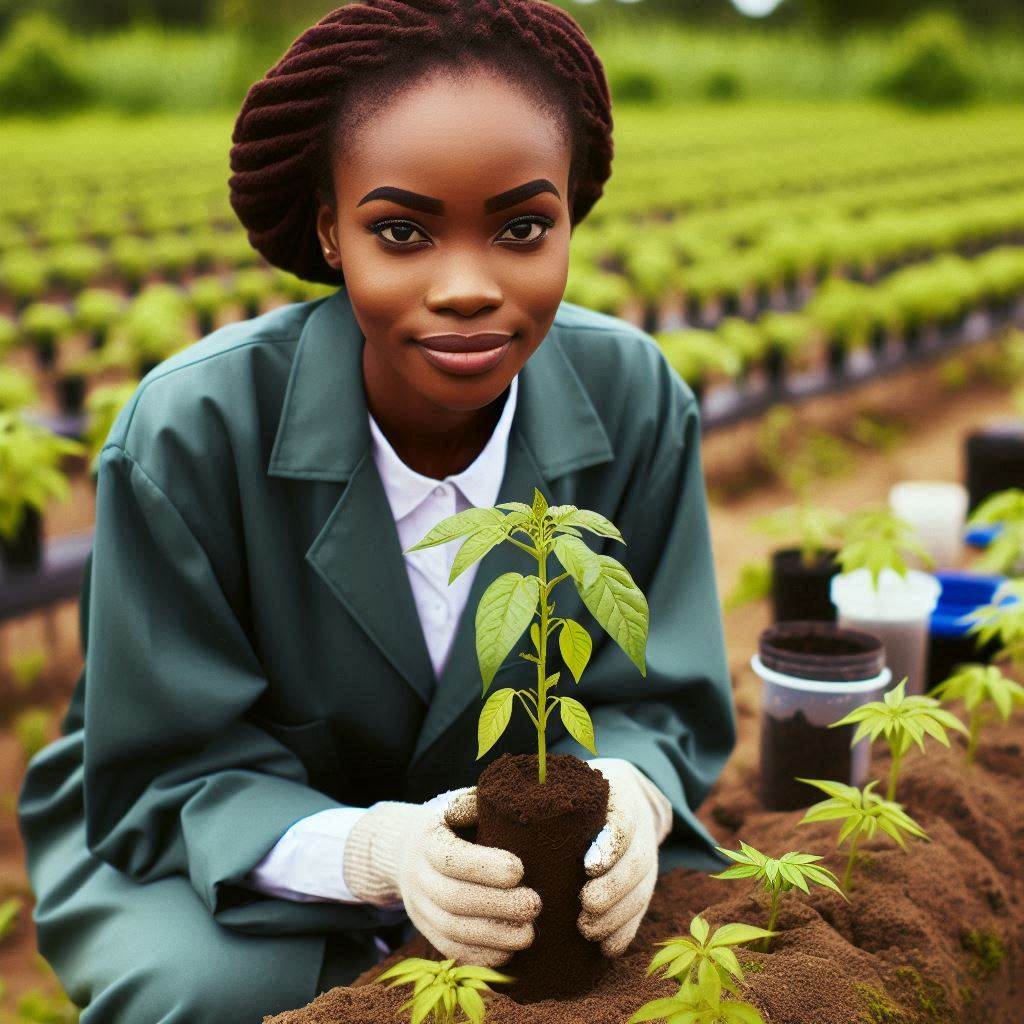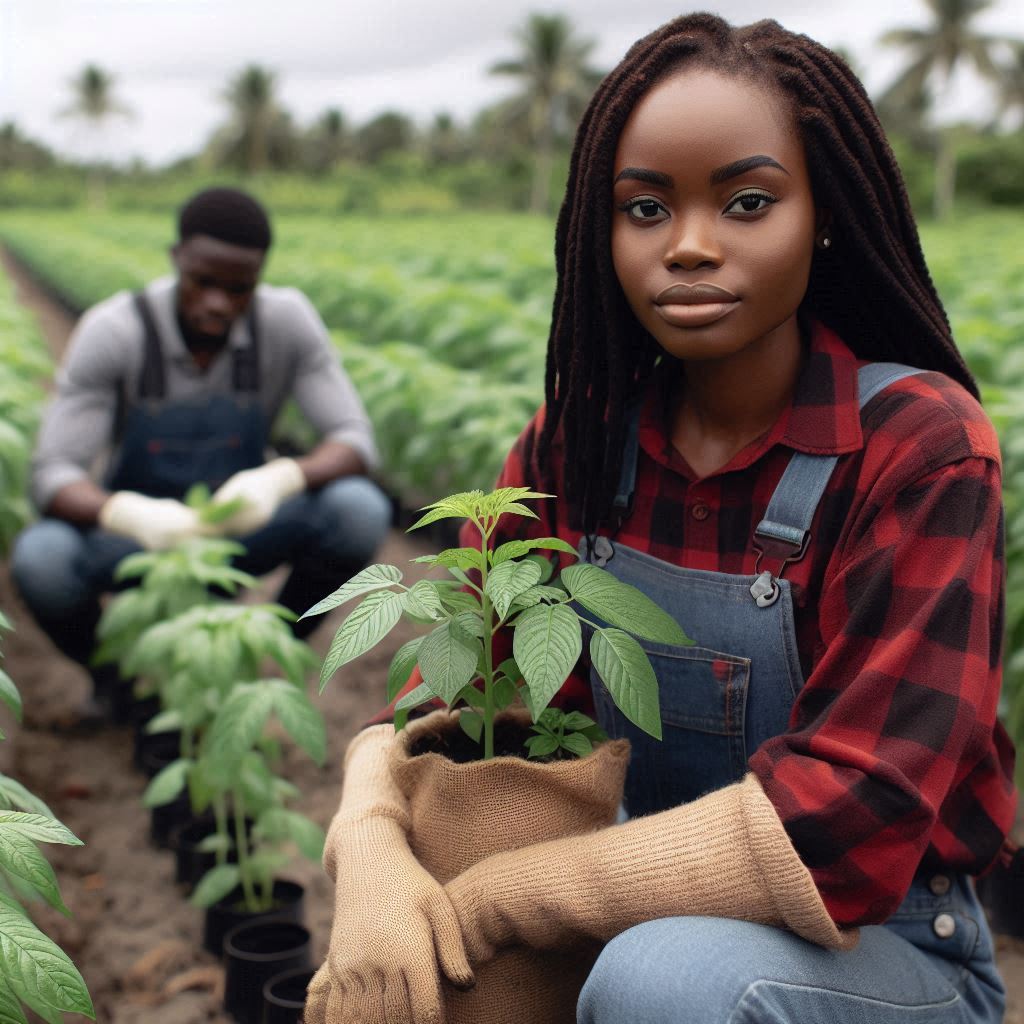Introduction
Plant breeding and seed science drive Nigeria’s agricultural advancement. They enhance crop yields, develop disease-resistant varieties, and ensure food security. However, the industry faces significant challenges that limit its potential.
Limited funding restricts research and development efforts. Without adequate financial support, scientists and breeders struggle to innovate and improve seed varieties. This funding gap stifles progress, leaving the industry lagging behind global standards.
Inadequate infrastructure presents another major obstacle. The lack of modern laboratories, greenhouses, and processing facilities affects seed production quality and quantity.
Additionally, efficient distribution networks are lacking, making it difficult for farmers to access high-quality seeds.
Farmers often face challenges accessing certified seeds, impacting crop productivity. Many rely on saved seeds or uncertified sources, leading to poor yields and disease susceptibility. This perpetuates a cycle of low productivity and poverty among smallholder farmers.
Policy inconsistencies further complicate the industry. Fluctuating regulations and lack of supportive policies create uncertainty for investors and stakeholders. This instability discourages investment and slows seed sector development.
Climate change poses an escalating threat to crop stability. Unpredictable weather patterns, extreme temperatures, and altered rainfall affect crop growth and yield. Breeders must develop resilient varieties to withstand these changes, but this requires time and resources.
This blog post explores these challenges in greater detail. By understanding these issues, we can develop effective solutions. Addressing these obstacles is crucial for enhancing Nigeria’s agricultural potential and ensuring a sustainable future.
Join us as we delve deeper into the complexities of plant breeding and seed science in Nigeria. We will examine the root causes of these challenges and discuss strategies to overcome them.
Through this exploration, we aim to uncover the path to a more resilient and productive agricultural sector in Nigeria. Let’s work together to build a stronger foundation for food security and economic growth.
Lack of Funding
- Limited financial resources allocated to research and development in plant breeding and seed science
- Impact on innovation and progress in the industry
- Case studies of specific instances where lack of funding has hindered advancements
One of the major challenges facing plant breeding and seed science in Nigeria is the lack of adequate funding.
This lack of financial resources allocated to research and development in these areas has significantly hindered progress and innovation in the industry.
Without sufficient funding, scientists and researchers are unable to conduct necessary experiments, purchase equipment, or even pay salaries for skilled professionals.
This limitation in resources directly impacts the ability to develop new and improved plant varieties and seeds that are essential for addressing food security and agricultural sustainability in the country.
Specific instances where lack of funding has hindered advancements include delays in conducting research trials, inability to acquire modern technologies for genomic studies, and limited capacity building programs for plant breeders and seed scientists.
These setbacks not only slow down the pace of innovation but also put Nigeria at a disadvantage compared to other countries that are investing more in plant breeding and seed science.
Overall, addressing the issue of lack of funding is crucial for the future of plant breeding and seed science in Nigeria.
By allocating more financial resources to research and development in these areas, the country can unlock new opportunities for improving crop productivity, resilience to climate change, and ultimately, ensuring food security for its growing population.
Read: Scholarship and Funding Opportunities for Forestry Students in Nigeria
Inadequate Infrastructure
- Insufficient facilities and equipment hinder research and experiments.
- Maintaining quality standards and seed viability become challenging.
- Outdated infrastructure slows down plant breeding programs.
In Nigeria, one of the major challenges facing plant breeding and seed science is inadequate infrastructure.
This poses significant obstacles to the effective functioning of research and experimentation processes, which are essential for the development of improved crop varieties.
Insufficient facilities and equipment for conducting research and experiments
The lack of proper facilities and equipment for conducting research and experiments in plant breeding hampers the progress of scientific studies. Without access to modern tools and resources, researchers struggle to carry out their work efficiently.
This leads to delays in the development of new crop varieties that could potentially address food security and agricultural sustainability issues in the country.
Difficulty in maintaining quality standards and ensuring seed viability
Moreover, the difficulty in maintaining quality standards and ensuring seed viability is exacerbated by the inadequate infrastructure.
Without proper storage facilities and maintenance equipment, the viability of seeds can be compromised, affecting their germination rates and overall quality. This can result in the production of lower-quality crops that may not meet the needs of farmers and consumers.
How outdated infrastructure affects the efficiency of plant breeding programs
Examples of how outdated infrastructure affects the efficiency of plant breeding programs can be seen in the limited capacity for data analysis and technological advancements.
Without access to advanced laboratories and technology, researchers are unable to analyze genetic data effectively or incorporate innovative breeding techniques into their work. This significantly hinders the pace of genetic improvement and crop development in Nigeria.
Basically, addressing the issue of inadequate infrastructure is crucial for the advancement of plant breeding and seed science in Nigeria.
By investing in modern facilities, equipment, and technology, the country can enhance its research capabilities and accelerate the development of high-yielding and resilient crop varieties.
This, in turn, will contribute to increasing agricultural productivity, improving food security, and promoting sustainable farming practices in the region.
Read: Field Work & Practical Training in Nigerian Forestry Schools
Policy and Regulatory Issues
- Conflicting regulations and policies that hinder the introduction of new seed varieties
- Delays in the approval process for seed certification
- Suggestions for streamlining regulations to promote a more conducive environment for plant breeders
Conflicting regulations and policies that hinder the introduction of new seed varieties
Plant breeding and seed science in Nigeria face numerous challenges, with policy and regulatory issues being a major hindrance to progress in this field.
The conflicting regulations and policies imposed by various government agencies often create roadblocks for plant breeders looking to introduce new seed varieties into the market.
This inconsistency not only delays the approval process for seed certification but also adds unnecessary burdens to plant breeders who are already facing numerous challenges in their work.
Delays in the approval process for seed certification
The delays in the approval process for seed certification further compound the challenges faced by plant breeders in Nigeria.
These delays not only hinder the timely introduction of new seed varieties but also affect the overall competitiveness of Nigerian plant breeders in the global market.
As a result, many promising seed varieties developed by local plant breeders may not reach farmers in a timely manner, leading to missed opportunities for increased crop yields and improved agricultural practices.
Suggestions for streamlining regulations to promote a more conducive environment for plant breeders
To address these policy and regulatory issues, there is a pressing need to streamline regulations governing plant breeding and seed science in Nigeria.
By creating a more conducive regulatory environment, plant breeders will be able to conduct their work more efficiently and effectively, leading to the timely introduction of new seed varieties into the market.
This will not only benefit plant breeders but also farmers, who rely on innovative seed varieties to improve their agricultural practices and increase their yields.
Therefore, policy and regulatory issues represent a significant challenge facing plant breeding and seed science in Nigeria.
By addressing conflicting regulations, streamlining the approval process for seed certification, and creating a more conducive regulatory environment, Nigeria can unlock the full potential of its plant breeders and seed scientists.
This, in turn, will drive innovation in the agricultural sector, improve crop yields, and ultimately contribute to the country’s overall food security and economic development.
Read: Traditional vs Modern Horticulture in Nigeria
Limited Human Resources
- Shortage of skilled professionals in plant breeding and seed science
- Brain drain as qualified individuals seek opportunities abroad
- Strategies for investing in education and training to develop a competent workforce
Shortage of skilled professionals in plant breeding and seed science
In Nigeria, one of the significant challenges facing plant breeding and seed science is the limited human resources available in the field.
The shortage of skilled professionals in these areas hinders the advancement of agricultural research and development in the country.
Brain drain as qualified individuals seek opportunities abroad
Furthermore, the issue of brain drain exacerbates the problem, as qualified individuals often seek better opportunities abroad.
This drain of talent not only depletes the pool of skilled workers in Nigeria but also results in a loss of valuable knowledge and expertise that could contribute to the growth of the agricultural sector.
Strategies for investing in education and training to develop a competent workforce
To address these challenges, it is crucial to implement strategies aimed at investing in education and training programs.
By focusing on developing a competent workforce through specialized training and capacity-building initiatives, Nigeria can build a strong foundation of skilled professionals in plant breeding and seed science.
Investing in education and training not only helps to attract and retain talent within the country but also ensures that individuals have the necessary skills and knowledge to drive innovation and research in the field.
By equipping professionals with the right tools and resources, Nigeria can enhance its capabilities in plant breeding and seed science and overcome the challenges posed by limited human resources.
In genera, the shortage of skilled professionals and brain drain in plant breeding and seed science in Nigeria present significant obstacles to the advancement of agricultural research and development.
However, by investing in education and training programs to develop a competent workforce, the country can overcome these challenges and build a strong foundation for growth and innovation in the field.
Read: Horticultural Tools and Equipment in Nigeria

Climate Change
- Impact of climate change on crop production and seed quality
- Challenges in developing resilient varieties that can withstand changing environmental conditions
- Research initiatives to address climate-related challenges in plant breeding
Climate change poses a significant threat to agriculture, impacting crop production and seed quality.
The unpredictable weather patterns and extreme events affect the overall growth and development of plants.
Developing resilient varieties is a key challenge faced by plant breeders in Nigeria.
The need for crops that can adapt to changing environmental conditions is crucial for sustainable agriculture.
Research initiatives are underway to address the challenges posed by climate change in plant breeding.
Scientists are working to develop new varieties that can withstand heat stress, drought, and other climatic challenges.
One approach is to utilize advanced breeding techniques, such as marker-assisted selection, to incorporate genes for resilience into crop varieties.
This can help improve the adaptability of plants to changing climate conditions.
Another focus of research is on enhancing the resilience of seeds to climate-related stress.
Improving seed quality through enhanced germination rates and stress tolerance can help ensure higher crop yields in challenging environments.
Collaboration between researchers, seed companies, and farmers is essential to address climate-related challenges in plant breeding.
By sharing knowledge and resources, stakeholders can work together to develop solutions for sustainable agriculture in the face of climate change.
Overall, climate change presents a formidable challenge for plant breeding and seed science in Nigeria.
However, with continued research and innovation, it is possible to develop resilient crop varieties that can thrive in changing environmental conditions.
Lack of Collaboration
- Fragmentation within the industry leading to duplication of efforts
- Benefits of collaboration between researchers, seed companies, and government agencies
- Examples of successful partnerships in plant breeding and seed science
Fragmentation within the industry leading to duplication of efforts
In Nigeria, one major challenge facing plant breeding and seed science is the lack of collaboration among various stakeholders in the industry.
This fragmentation leads to duplication of efforts, as different organizations and individuals work on similar projects without sharing resources or information.
Without a coordinated approach to research and development, valuable resources are wasted, and progress is hindered.
By working in silos, researchers, seed companies, and government agencies miss out on the benefits of pooling their expertise and resources to address common challenges.
Benefits of collaboration between researchers, seed companies, and government agencies
Collaboration is essential for advancing plant breeding and seed science in Nigeria.
When researchers, seed companies, and government agencies work together, they can leverage their respective strengths and resources to achieve common goals more efficiently and effectively.
Transform Your Career with Expert Guidance
Get personalized mentorship consulting that’s tailored to your unique path. Our expert advice is actionable and exclusive.
Get StartedBy sharing data, resources, and expertise, collaborators can accelerate the pace of research and development, leading to the introduction of improved varieties, increased seed production, and enhanced food security.
Collaboration also fosters innovation and allows for the exchange of best practices and knowledge among stakeholders.
Examples of successful partnerships in plant breeding and seed science
Despite the challenges, there are examples of successful partnerships in plant breeding and seed science in Nigeria that highlight the benefits of collaboration.
For instance, the collaboration between the International Institute of Tropical Agriculture (IITA) and national research institutions has resulted in the development of high-yielding and disease-resistant crop varieties.
Another successful partnership is the alliance between multinational seed companies and local farmers’ cooperatives, which has enabled smallholder farmers to access high-quality seeds and adopt modern agricultural practices.
Government agencies have also collaborated with research institutions and seed companies to support the development and dissemination of improved crop varieties.
These successful partnerships demonstrate the value of collaboration in overcoming the challenges facing plant breeding and seed science in Nigeria.
By working together, stakeholders can harness their collective expertise and resources to drive innovation, improve agricultural productivity, and enhance food security for all Nigerians.
Uncover the Details: Innovative Techniques in Pasture Management for Nigerian Farmers
Market Access and Distribution
- Limited access to markets for new seed varieties
- Challenges in distribution and marketing of improved seeds to farmers
- Recommendations for improving seed supply chains and ensuring farmers have access to quality seeds
Limited access to markets for new seed varieties
Access to markets is crucial for plant breeders and seed scientists in Nigeria. They invest time and resources in developing new seed varieties, but if these varieties cannot reach the farmers who need them, their efforts will be in vain.
Limited access to markets hinders the adoption of new seed technologies and limits the impact of plant breeding programs.
Challenges in distribution and marketing of improved seeds to farmers
Distribution and marketing of improved seeds pose significant challenges in Nigeria. The country’s agricultural sector is fragmented, with small-scale farmers making up the majority of the farming population.
These farmers often lack information about the benefits of using improved seeds and struggle to access them through formal channels. As a result, they continue to rely on traditional seed varieties that may be less productive and less resilient to pests and diseases.
To address these challenges, it is essential to improve seed supply chains and ensure that farmers have access to quality seeds. One key recommendation is to strengthen the linkages between seed producers, distributors, and farmers.
This can be done through the development of seed networks or cooperatives that facilitate the sharing of knowledge and resources.
By collaborating with extension services and agricultural input suppliers, seed companies can reach more farmers and educate them about the benefits of using improved seeds.
Recommendations for improving seed supply chains and ensuring farmers have access to quality seeds
Another recommendation is to invest in infrastructure that supports the distribution of seeds, such as seed processing facilities and storage warehouses.
By improving the efficiency of seed supply chains, companies can reduce losses and ensure that farmers receive high-quality seeds in a timely manner.
Additionally, efforts should be made to train farmers on seed selection, storage, and planting techniques to maximize the benefits of using improved varieties.
In review, market access and distribution are significant challenges facing plant breeding and seed science in Nigeria.
By implementing strategies to improve seed supply chains and ensure farmers have access to quality seeds, we can enhance agricultural productivity, increase food security, and promote sustainable farming practices in the country.
Discover More: Introduction to Plant Breeding and Seed Science in Nigeria
Conclusion
In closing, plant breeding and seed science in Nigeria face significant challenges. Limited funding hampers research and development efforts. Inadequate infrastructure affects seed production and distribution.
Farmers often lack access to certified seeds, reducing crop productivity. Policy inconsistencies create uncertainty for investors and stakeholders. Climate change further threatens crop stability and yields.
Stakeholders must address these issues urgently. Increased funding and investment in infrastructure are crucial.
Policymakers should establish consistent and supportive regulations. Ensuring farmers have access to quality seeds is essential for improving productivity.
With collaborative efforts, Nigeria can overcome these challenges. Innovative solutions and teamwork will drive progress in the agricultural sector.
By addressing these obstacles, we can hope for a brighter future. Enhanced plant breeding and seed science will lead to greater food security and economic growth.
Together, we can support the growth of this vital industry and secure Nigeria’s agricultural future.




